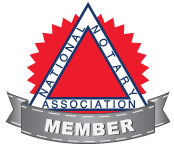What is a Notary Public?
A Notary Public is a government officer and public servant who serves as an impartial witness in talking acknowledgments, administering oaths and affirmations, and performing other acts authorized by law. These official acts are called notarizations or notarial acts.
When documents are notarized, the public can be assured that its signer is not an impostor and any contracting parties can be assured that the document they have signed will have full force and effect.
A notarized document is considered "self-authenticating." The same is true under the rules of evidence in effect in each state.
When a document is self-authenticating, the signers of the contract do not need to testify in court to verify the authenticity of their signatures. That saves a lot of time and money. Having a document notarized is, "a huge strategic advantage" in litigation.
In the United States, state laws define the Notary's powers. State statues also set the boundaries of the Notary's appointment. The general rule is that each jurisdiction appoints state residents as Notaries who may notarize documents only within the physical boundaries of the state.
The public official status of the Notary Public also obligates the Notary to serve all members of the public without regard to the signer's race, nationality, ethnicity, citizenship, religion, politics, lifestyle advance age, disability, gender or sexual orientation.
Notaries are not required to investigate the transactions they notarize with the possible exception of scanning the document's text for completeness. The scanning process helps uncover incomplete spaces that could be exploited for fraud.
The Notary should carefully consider the implications of a possible disqualifying interest prior to notarizing a document for a person in any close relationship with the Notary (e.g. a "significant other") and decline the notarization if even an appearance of partiality exists.
The document signers must personally appear in the Notary's presence at the time of notarization is arguably the preeminent principle of notarization. Waiving personal appearance for any reason is unacceptable, without a personal appearance the Notary will never know if the signature was made willingly. The signer may have been coerced to sign against his or her will.
Personal appearance before a notary means, a notary is physically close enough to see, hear, communicate with, and receive identification documents from a principal and any required witness. All signatures must be performed in front of the notary. Each signer must present a valid unexpired government-issued photo ID, such as a Driver's license or non-driver's ID or current passport.
#1 in Notary Bonds, Supplies & Education, Step-by-Step Guidance to Start Your Commission, Online Application & Checklist Make It Easy, Total Satisfaction Guarantee
The Worry-Free Way to BECOME A NOTARY

